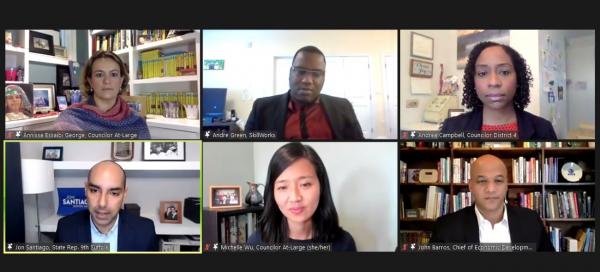April 29, 2021

Boston mayoral candidates Annissa Essaibi George, Andrea Campbell, Jon Santiago, Michelle Wu, and John Barros discussed their workforce development platforms in a forum hosted Thursday by the Job Training Alliance.
Five Boston mayoral hopefuls pitched their workforce development visions and records Thursday, voicing broad agreement on the need to improve access to child care and offering ideas for how to help connect immigrants learning English and people returning from incarceration with jobs.
The Job Training Alliance, a coalition of 18 job training providers, hosted the five candidates -- City Councilors Michelle Wu, Andrea Campbell and Annissa Essaibi George, state Rep. Jon Santiago and Boston Chief of Economic Development John Barros -- for a virtual forum. Acting Mayor Kim Janey, who is also seeking a full term in City Hall, was unable to attend, said moderator Andre Green, the executive director of SkillWorks.
Boston's City Council on Wednesday voted to move up the preliminary mayoral election to Tuesday, Sept. 14, a date that will fall just about three weeks after Janey's Aug. 22 target for lifting all remaining COVID-19 industry restrictions and allowing the final group of still-closed businesses, including nightclubs, to reopen.
The city's next mayor will help chart a course for its post-pandemic economic recovery, including for workers who lost their jobs during the COVID-19 crisis and others who left the workforce to care for children home from school and other family members.
Candidates drew on their personal experiences as they fielded questions about supporting groups including women trying to re-enter the workforce and immigrants with limited English proficiency.
Wu said that the challenges her family has experienced with her son's remote kindergarten have informed her campaign's plan to close gaps in digital and technology access. She said the COVID-19 crisis has created new momentum around the push for universal pre-kindergarten and access to affordable child care, and called for Boston to become "the most family-friendly city anywhere in the country."
Santiago said his work with patients as an emergency room doctor has shown him that factors like "lack of transportation equity, lack of economic and educational opportunity [and] lack of workforce development" have health impacts and need to be addressed. Born in Puerto Rico, Santiago recalled his mother taking English classes at UMass Boston and said there aren't enough similar opportunities for people today.
Barros, the son of immigrants he said arrived here knowing little to no English, said more seats need to be available in English acquisition classes, and in areas convenient to immigrant communities. Saying his parents "had to work too many jobs, too often" when he was growing up, he voiced support for expanding paid parental leave across the city's work sectors and increasing the city's supplier diversity.
Campbell's twin brother died in Department of Correction custody at age 29, and she said the question that inspired her to run was "How do two twins, born and raised in the city of Boston, have such different life outcomes?" She said federal money should be used to help people who are out of work, and in response to a question about helping people get jobs after incarceration, said that efforts to connect them with things like driver's licenses and housing should begin during their sentence.
Essaibi George said reentry planning should begin the day incarceration starts, and that work should be done to "decriminalize homelessness, mental health disorders, substance use disorders and make sure that our residents, our neighbors, have access to supportive programs." A former Boston Public Schools teacher, she said she wants to establish "equitable baseline standards and resources" for the city's schools and a structured early literacy program.
To make it onto the September ballot, mayoral candidates need to collect signatures from 3,000 registered voters and file their nomination papers by May 18. Winners from the preliminary contest will face off in a Nov. 2 municipal election.


